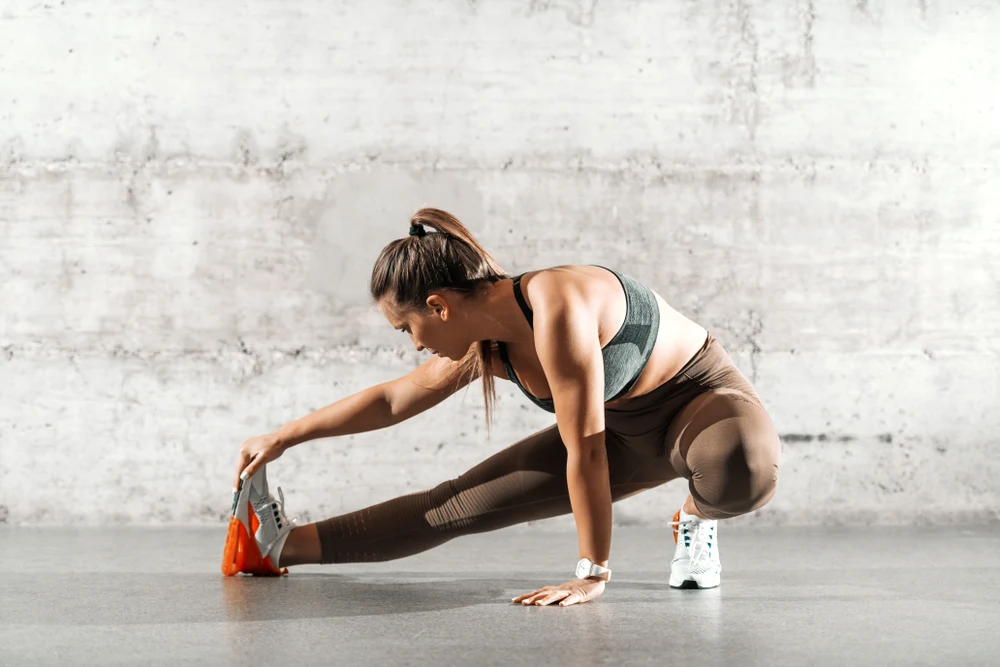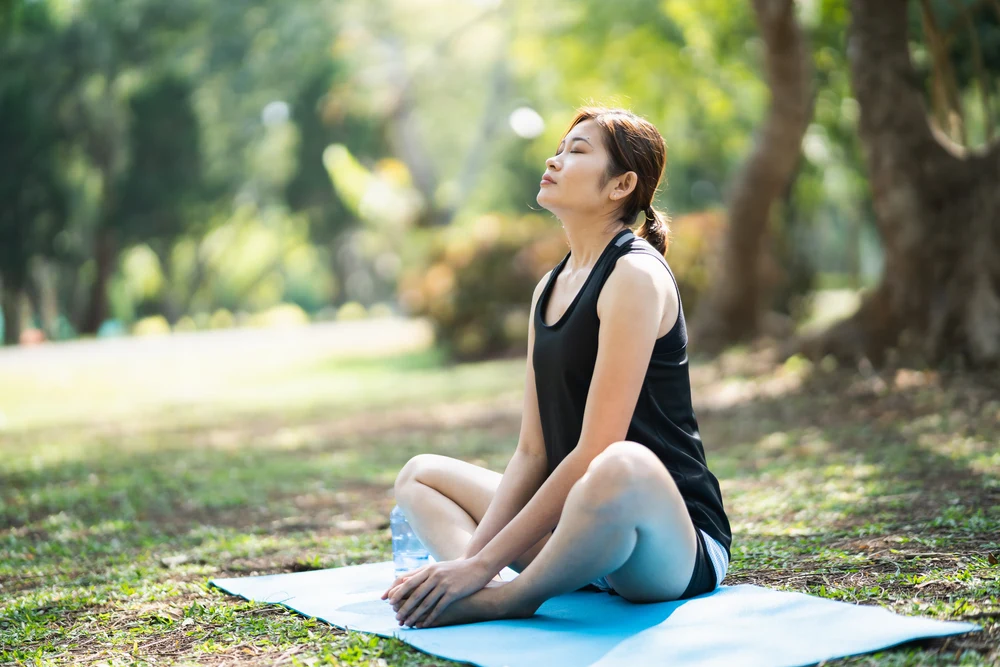IBS & Exercise: Our Tips For Working Out With Irritable Bowel Syndrome

September 27, 2022 - Updated September 27, 2022

Feeling gassy, bloated or uncomfortable while you’re exercising isn’t a nice experience and can be enough reason to postpone your workout altogether, yet for people with irritable bowel syndrome (IBS), this can be an everyday issue.
When things don’t feel right in your gut or you know you may need to rush to the loo at any moment, exercising might seem like the last thing you’d want to do, but it can actually help to improve your IBS symptoms. The trick is knowing what kind of physical activity is best and what to avoid, as some training styles may leave you feeling worse than when you started.
What is irritable bowel syndrome?
Irritable bowel syndrome (or IBS) is a common digestive disorder of the bowel and large intestine, affecting 10-30% of the population. It’s also more prevalent in women than men, with studies pointing to sex hormones and gender differences that play an important role in the condition's pathophysiology.
IBS is a chronic condition that can cause a range of symptoms such as bloating, excess gas, constipation or diarrhoea or both, cramping and abdominal pain. For each person with IBS, these symptoms can vary in severity, frequency, duration and triggers.
Luckily, it’s not dangerous or life-threatening, but it can be very uncomfortable and have a negative impact on your daily life and mental health. Because the exact cause isn’t known and there isn’t a cure, IBS requires long-term management, but some lifestyle changes can have a positive effect on symptoms.
What triggers IBS symptoms?
Common triggers that may cause IBS symptoms to flare up include:
Food intolerances (such as lactose, wheat or gluten, onion or garlic)
Spicy, fatty, sugary or overly processed foods
Hormonal changes
Alcohol
Coffee or caffeine
Stress
Certain medications
Gastrointestinal infections

How does exercise affect IBS?
When it comes to the connection between exercise and IBS symptoms, it depends largely on the training style and intensity of your workouts. Everyone is different, but generally, the higher the intensity and the longer the duration of your workout, the more likely you are to experience flare-ups. This is due to the way high-impact or high-intensity training can upset your gut and put additional stress on your whole body, including your digestive system.
On the other hand, choosing low to moderate-intensity exercise may help improveyour symptoms, by reducing your levels of stress and inflammation, as well as promoting healthy bowel movements, the release of excess gas, improved sleep and better overall wellbeing.
One 2018 study investigated the effects of low to moderate-intensity exercise on women with IBS. After 24 weeks, anti-inflammatory and antioxidant biomarkers had both improved in sedentary patients.
Another 2019 study investigated the effect of six weeks of aerobic exercise on 20 women with mild to moderate IBS. The control group continued with their usual daily routine and the exercise group performed 30 minutes of aerobic training on a treadmill, three times a week. The researchers observed a significant improvement in the severity of their symptoms and their quality of life compared to the control group!
Positive long-term effects on IBS symptoms - both physical and psychological - were also observed in a 2015 study that aimed to assess the effects of physical activity on IBS symptoms, quality of life and mental health over a period of 3.8 - 6.2 years, with the most common activities being walking, cycling and aerobics.
For low-impact strength training in the Sweat app, you might want to try Barre with Britany, Pilates with Sara, Bodyweight Strength with Anissia Hughes or even BUILD for a heavy lifting program without any jumping. See how you feel and make modifications to best suit your body.

Tips for working out with IBS:
It’s a good idea to check with your healthcare provider before starting a new exercise program and to ask for their advice. Do not start a new fitness program if your healthcare provider advises against it.
Start with low or moderate-intensity exercise like walking, cycling, swimming, bodyweight workouts, yoga and stretching. See how you feel after each session and make a note of whether your symptoms improve or flare up.
Avoid high-intensity and high-impact exercise, as these can put your body and digestive system under more stress. The impact of jumping movements and running can also upset your gut. Core workouts are fine for some people, but for others can cause more discomfort and strain on your abdomen, so see how you feel.
If you feel great doing low or moderate-intensity workouts and want to try something more vigorous or a heavier strength training program, it’s recommended you increase the intensity slowly and listen to your body throughout. Depending on how you feel, you may need to slow the pace, take more breaks, modify some movements, or stop completely - all of which are absolutely fine!
Avoid having caffeine (such as coffee or pre workout) before you exercise as it can aggravate your symptoms.
Drink plenty of water throughout the day and during your workouts to promote healthy, regular bowel movements and optimal digestion.
If you find your symptoms and flare-ups are unpredictable or sensitive to exercise, it can help to work out at home so you have a bathroom close by, or know where the nearest one is if you’re exercising outside or in a gym.

The power of yoga
According to one 2019 review, current research suggests yoga is effective and safe for people with IBS and may help to improve multiple aspects involved in IBS treatment. Evidence has also shown that yoga can be just as effective as dietary changes or moderate-intensity walking when it comes to seeing both physical and mental health improvements. While more research is needed, the current data supports the benefits of yoga as a form of therapy for people with IBS.
Another 2015 study aimed to evaluate the effectiveness of a Remedial Yoga course as an IBS intervention, and researchers observed significant improvements in the groups who participated in the yoga program compared to the control group.
In the Sweat app, Yoga with Phyllicia and Yoga with Ania are two great options if you’re looking to follow a yoga program, or you can select a yoga flow from the On Demand section.
Yoga and practices like mindfulness and meditation can also be an amazing way to increase your mind-body connection to make you more in tune with your symptoms and triggers, as well as calming your body and mind.
Dealing with IBS can make life challenging in a range of ways, especially if your symptoms are severe or unpredictable, but for many people exercise has been shown to have a positive effect.
Start slowly, keep a record of what exercise you did, how you felt and any symptoms you experienced, let your healthcare provider know if your symptoms get worse, and stick to the training styles that make YOU feel good.

A more empowered you starts with Sweat, and our editorial team is here to bring you the latest fitness tips, trainer recommendations, wellbeing news, nutritional advice, nourishing recipes and free workouts.
* Disclaimer: This blog post is not intended to replace the advice of a medical professional. The above information should not be used to diagnose, treat, or prevent any disease or medical condition. Please consult your doctor before making any changes to your diet, sleep methods, daily activity, or fitness routine. Sweat assumes no responsibility for any personal injury or damage sustained by any recommendations, opinions, or advice given in this article.
Wellbeing